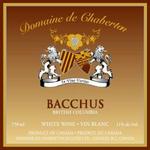 |
|
Wine Details
Price:
$13.99 per bottle
Description:
The Estate's award-winning Bacchus is a truly refreshing and balanced white wine. This varietal grape (cross of Riesling-Silvaner x Müller-Thurgau) is high in body and character and although it requires a skilled cultivation, the experienced vintner is rewarded with with intense flavours and rich aromas of peach and light Muscat.
|
|
|